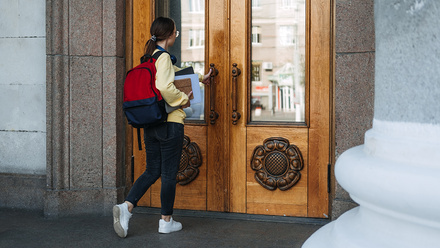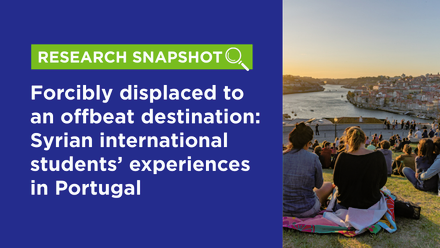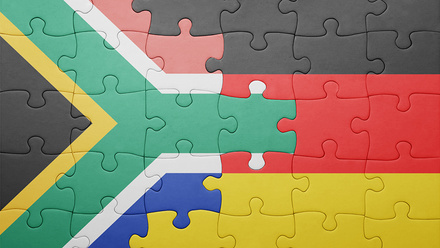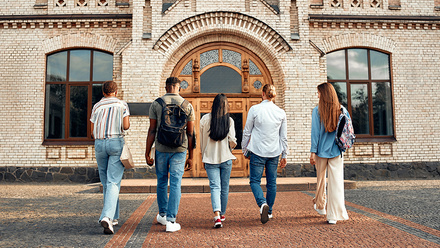Rethinking international education in unstable zones: the LAU experience – Lebanon

I have been involved in international education in Lebanon for the past 14 years, and I am acutely aware of the risks and instability associated with working in such a volatile region. In Lebanon, we tend to experience a crisis every five years or so. However, this country's beauty lies in its people's resilience, who rise up each day to rebuild and live life to the fullest. As the Senior Director for International Services and Programs at the Lebanese American University, I have faced the challenge of maintaining our commitment to international education while responding to rapidly changing circumstances.
When war breaks out, many assume that international education comes to a halt. However, for institutions like LAU, it never truly stops. As the leader of international programmes in one of the world’s most politically unstable regions, I had to reassess everything when full-scale war erupted in September 2024. I have faced urgent questions: How can we ensure safety without abandoning our mission? What does a sense of belonging look like when borders close and bombs fall all around? And once the crisis subsides, how do we rebuild and restore faith in the future of global learning?
We were forced to make immediate decisions. Within 48 hours, evacuation plans were set into motion. Students were relocated, some to third countries, others to virtual formats, until they could continue their education safely. Our focus shifted from long-term programming to emergency response, yet we never lost sight of the broader mission. We had to communicate accurately and transparently with students, sponsors, and families across the globe.
The strength of our networks and the trust we had built over the years with our partners helped us weather this storm. For example, funders, through Erasmus+ networks, responded with flexibility and support. Faculty rose to the challenge, adapting curricula to accommodate displaced students. Staff worked around the clock to provide logistical, emotional, and academic support. This was not merely about continuity, it was about community support, compassion, and survival.
Our focus shifted from long-term programming to emergency response, yet we never lost sight of the broader mission.
Lessons learned
Our experiences uncovered several important insights regarding crisis management in educational contexts.
- First and foremost, we have come to realise that crisis preparedness is no longer just an afterthought; it should be a core component of any international strategy. The landscape has shifted, and now aspects like hybrid mobility, decentralised operations, and cross-border academic collaborations have become essential for maintaining flexibility in our approaches. Another vital lesson is the importance of empathy and communication. During a crisis, it's crucial for students to feel acknowledged and supported. Consistent check-ins, trauma-informed advising, and responses that are sensitive to cultural nuances can significantly impact their well-being. It is so hard for administrators to prioritise the needs of students when they are themselves displaced or in danger, and in our context, we had to make those decisions, which were a driving force for our survival.
- Equity is another critical factor that must guide our decision-making processes. While some students may have the means to leave conflict areas, many do not. How do we deal with that? Educational institutions must create ethical frameworks that address these disparities.
- Lastly, we must recognise the valuable expertise that institutions in the Global South possess. Places like LAU often operate under difficult conditions, yet broader global education networks frequently overlook their knowledge and skills. This needs to change; acknowledging and valuing this expertise is essential for moving forward in a more equitable manner.
Return to normal or restart?
What happens after the war ends? It’s tempting to dream of a "return to normal," but this is not realistic or useful. Should we abandon international education or recognise more than ever before that it is part of the solution for a more peaceful future? Instead of restoring what was, we are reimagining what could be.
In the aftermath of conflict, the process of rebuilding communities should prioritise global learning as a fundamental aspect of recovery. Education on an international scale plays a crucial role in this context. It can encourage dialogue and promote healing by bringing together students from diverse backgrounds, allowing them to share their experiences and reflections. Additionally, it can create economic opportunities through scholarships, collaborations, and mobility programmes that enhance access to education. Furthermore, it serves to combat feelings of isolation by reminding communities that they remain connected to a broader global network, even when local circumstances seem precarious.
At LAU, we are already thinking about what comes next. We are working on regional hubs that can serve as safe havens for students and scholars. We are also advocating within local and global policy spaces to ensure that institutions in crisis zones have a voice in shaping the future of international education.
In the aftermath of conflict, the process of rebuilding communities should prioritise global learning as a fundamental aspect of recovery. Education on an international scale plays a crucial role in this context.
Stand with us
To my colleagues in the international higher education community: This is a plea not for pity but equal partnership. Institutions in conflict-affected areas do not need saving – we need solidarity.
We need more inclusive funding mechanisms, agile collaboration models, and platforms that centre voices from the Global South. We need shared knowledge production, not one-directional aid, because even though we are broken, we have a lot to offer in knowledge, skill, and talent. Most importantly, we need a shift in mindset: that the frontlines of global education are not only in New York, London, or Paris but also in Beirut, Damascus, Gaza, and beyond.
Crisis does not cancel international education. It reshapes it, making it more urgent, more human, and more necessary than ever. Let us come together as an international community to create new pathways for everyone.






